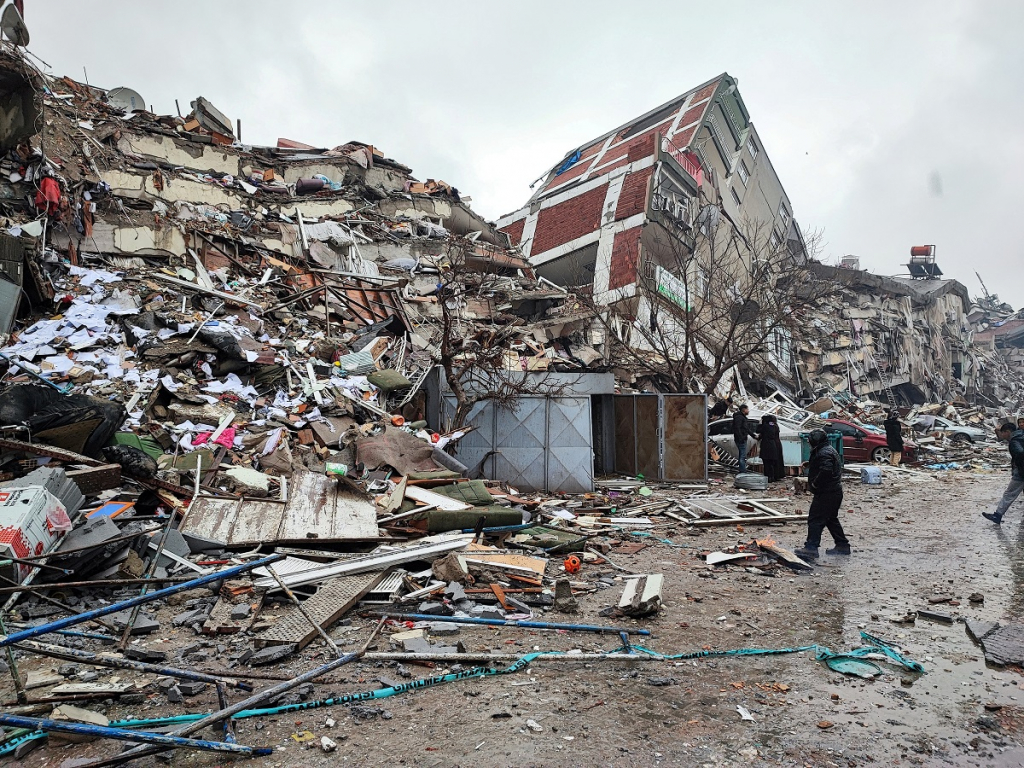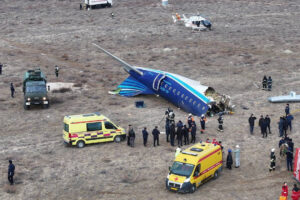The numbers are frightening: at least 50,000 dead , 214,000 buildings that have collapsed or are in danger of collapsing, and in Turkey alone eleven large cities have been almost completely destroyed. Plus millions of people who have lost their homes and are in urgent need of help. A month after the devastating earthquake in Turkey and Syriathe full extent of the damage is still not known. The only thing that is clear is that it is one of the most serious natural disasters in the region in recent decades. The death toll is expected to continue to rise: there are still numerous victims whose identities are unclear and some who are not yet officially registered. Survivors continue to search for their family members. When asked by DW, the Turkish Ministry of Justice declined to say how many people are still missing in Turkey alone.
The responsibility of the state
Immediately after the quake, the survivors mixed with grief and anger. How could so many supposedly earthquake-proof buildings just collapse? The negligence of the Turkish state is said to be responsible for the fact that the earthquake could have such serious consequences. It turned out that in many cases building regulations were not followed, leading to an aggravation of the disaster. So far, the Turkish authorities have put a total of 957 people under suspicion in connection with the earthquake, who are said to be partly responsible for the high number of victims and the great damage. So far, 236 suspects have been arrested, another 330 have been placed under “judicial control,” and four are still in custody. Arrest warrants have been issued for 270 of the suspects. Five are abroad. 82 were released. 32 have died.
In addition, recommended preventive measures have simply not been taken. There are reports from Turkey’s civil protection authority, the AFAD, which warned years ago of the serious consequences of a possible earthquake : The so-called IRAP reports, the “Plans for Minimizing Disaster Risks”, were prepared and published between the years 2019-2021.
The AFAD’s first IRAP report in 2020 assumed that a major 7.5 magnitude earthquake would occur in Kahramanmaras. On February 6, the scientists’ forecasts, which were apparently ignored by the state, came true.
A misery: children without carers
One of the biggest topics of discussion in society is the situation and future of the affected children. According to UNICEF, the earthquake in Turkey and Syria is said to have affected around five million children .
According to the Department of Family and Social Services, as of March 1, a total of 1,911 children with no surviving legal guardians have been rescued from the ruins and registered. After an ID check, 1,543 children are said to have already been delivered to family members. 95 children are currently under the protection of the ministry. The identity of 81 children has not yet been clarified.
It was publicly claimed that some children had allegedly been given into the hands of Islamist pro-government communities and associations. The responsible ministry rejected the allegations. However, a report by anti-government broadcaster Halk TV revealed that 60 orphaned children were housed in three houses in Istanbul’s Beykoz district. There they are said to be in the care of an Islamist community.
A DW report also revealed that nine children were taken away from their parents and registered for a so-called Koran course. The course is said to be run by the radical Ismailaga community. The association “Women and Children First” reported both cases.
elections ahead
While the government is held jointly responsible for the devastating consequences of the earthquake, Turkey is heading towards the presidential and parliamentary elections. The catastrophe also caused politicians to briefly interrupt the election campaign.
Now it seems to have started again: On March 1, President Recep Tayyip Erdogan criticized the opposition in a speech and declared that the elections should be brought forward and held on May 14. In the current atmosphere of Turkish politics, his word is law. He is expected to issue a decree on March 10 making the new date official.
However, no one knows how the election will take place in the cities affected by the earthquake. That should be clarified after March 10th. There is talk of voters from the earthquake area being able to cast their ballots in other cities for the presidential election, but not for the parliamentary election.
Rebuilding costs money
The upcoming mammoth task of reconstruction comes at a time when Turkey is already suffering from an economic crisis. According to World Bank calculations, the earthquake caused material damage of 34.2 billion US dollars. According to the Turkish Statistical Office (TÜIK), around 14 million people live in the 11 cities in the earthquake area. This area generates about 9.8 percent of the gross domestic product. The economy in the region is based on agriculture and livestock, as well as textiles, steel and energy.
Mahfi Egilmez, economist and former Secretary of State in the Ministry of Finance, published a detailed study on the economic consequences of the quake. He included the removal of ruins and rubble, housing construction, repair of damaged housing and infrastructure. In addition to the cost of these measures, government grants of US$2.5 billion are planned. The total costs amount to 48.7 billion US dollars. $27 billion of that would go toward building new homes.
Experts estimate that the destruction will increase demand for many products and services, which in turn will fuel already high inflation. In an interview with DW, economist Murat Kubilay emphasizes that inflation will be at least around 50 percent by the end of the year.
restriction of freedom of expression
Freedom of the press and freedom of expression, which has been under pressure in Turkey for years anyway, was further restricted after the earthquake. Turkey’s private broadcasting regulator, RTÜK, fined three TV stations for covering the earthquake. The penalties amount to around eight million Turkish lira (about 400,000 euros).
Expressions of opinion are now also being punished in football stadiums: the fans of the two major Turkish football clubs, Fenerbahce and Besiktas, called on Erdogan and his government to resign from the stands at the weekend . The fans who took part are no longer allowed to attend any sporting events on site from now on.
Syria: War and Disaster
In northern Syria, the earthquake hit a region that had already bled dry: T he country has been in a civil war for twelve years, which the regime, with Russian and Iranian support, has now largely won. After the hardships of the war, many people in northern Syria have now become homeless. According to media reports, around 8.8 million people are affected by the aftermath of the earthquake. 5900 deaths were reported, but the actual number is likely to be significantly higher.
Most of those affected in Syria received no help at all in the first few days. This was partly due to blocked border crossings. Aid is now being delivered to Syria, but much does not reach its destination. Large parts of the Syrian earthquake zone are not controlled by Bashar al-Assad’s regime. The city of Idlib, for example, is considered the last rebel stronghold, controlled by predominantly Islamist militias. More than two million people who fled from different parts of Syria live here. Aid that is officially sent to Syria often does not arrive here at all, observers and those affected complain.
A total of around 1.8 million displaced people were already living in tents, shelters and simple houses in north-west Syria before the earthquake. Now the situation has worsened significantly. Countless victims live in destroyed houses, others spend the night outdoors in freezing temperatures or live in their cars, like family man Ammar Fayyad in Idlib. “My son and I are traumatized,” he told a reporter on DW’s Arabic program. “Tents cost between $200 and $400, we can’t afford that. So we decided to stay here.”
Source : DW.COM












